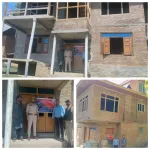The National Cleanliness Survey is out. It must make the people of Jammu and Kashmir ponder over its results. Hygiene and disposal of waste has been the national priority of the incumbent regime at the centre. Swach Bharat has undoubtedly changed the national mind set. It has sensitised the people of all age groups towards waste disposal management. There has been a considerable change in the waste disposal habits of the people all over the nation. Pandemic also added to the sensitivity towards the hygiene and waste disposal. As fundamental precaution to nip any virus or epidemic lies in cleanliness. Waste disposal has always posed a challenge for the municipalities and workers who are deputed to manage the waste. But when it comes to health issues and the enormous life threat posed by COVID people have mended their ways and approach towards the waste disposal. Recent National Cleanliness Survey should set the priorities for the people of Jammu and Kashmir. As the results clearly state the preparedness of the union territory in terms of waste management. Srinagar has emerged at 234th and Jammu 248th rank respectively. Analysts are satisfied that at least Srinagar has emerged at comparatively higher rank than Jammu. No doubt it gives some respite to the policy makers and the waste management agencies like municipalities. But we must ask ourselves. Is it enough? Jammu and Kashmir is known for its beauty and natural bounties. We have spoiled the natural resources and over utilised them. Our waste disposal habits are still in infancy. We are guided by penalty and not by our inner conscience to dispose waste. We can emerge at the top rank in terms of cleanliness only when we are not guided by external pressure to stop spoiling our lanes, by lanes and public places. Not only that we don’t even spare religious places and convert them into dumping yards. Jammu and Kashmir is the most sought after destination for the national and international tourists. Not only infrastructure and superstructure but the overall cleanliness at tourist places, hotels and roads creates the tourist gaze. Cleanliness can be achieved by synergetic efforts of both public and administration. The reason being cited for lower rank of Jammu in the cleanliness rank is due to the non-functioning of the waste processing unit at Kot Bhalwal. With the passage of time, increase in urbanisation and expansion of cities besides the rapid increase in consumerism has led to the manifold increase in quantum of waste. It needs planning and strategies that are comprehensive. The satisfying outcome of this Cleanliness Survey is the emergence of Katra city as the number one city among the cities having a population of one lakh. Katra town witnesses the influx of nearly one crore pilgrims who undertake the pilgrimage to the holy cave of Shree Mata Vaishno Devi Ji in the Trikuta Hills. Inspite of this Katra has managed to emerge as the most clean city in the country. This must infuse a sense of optimism in all of us that we can set new benchmarks to create more model cities in terms of cleanliness. Jammu and Kashmir has to keep pace with the national development and set new records of achievements in all areas of good governance and development. Cleanliness will surely define tourism and its multiplier effect in various fields of public good.
Clean Jammu and Kashmir
Sign Up For Daily Newsletter
Be keep up! Get the latest breaking news delivered straight to your inbox.
By signing up, you agree to our Terms of Use and acknowledge the data practices in our Privacy Policy. You may unsubscribe at any time.
Leave a Comment Leave a Comment
Stay Connected
Latest News
Recent Posts
- Property of notorious drug peddler attached in Handwara: Police
- SMVDSB refutes ‘negligence’ claims on pilgrim tragedy
- Power shutdown announced in Kashmir; check areas here
- LG Sinha orders inquiry into Vaishno Devi landslide tragedy, panel to submit report in two weeks
- Habitual Timber Smugglers detained under PSA in Kupwara





